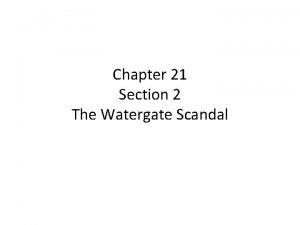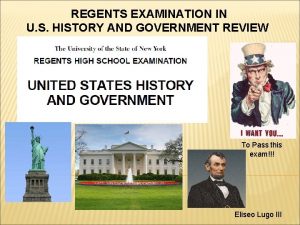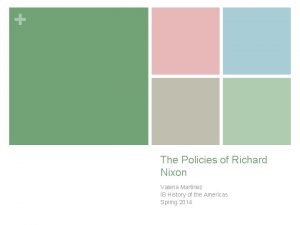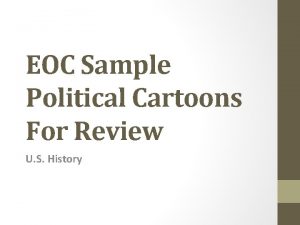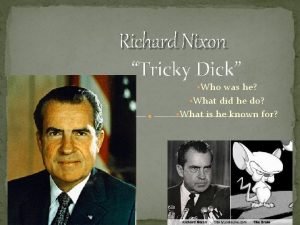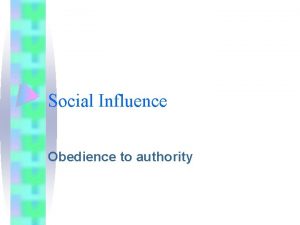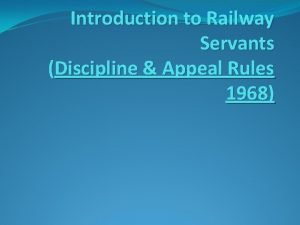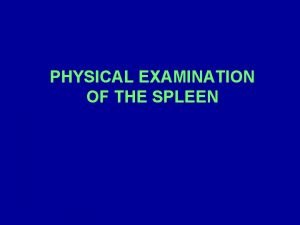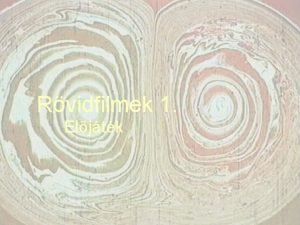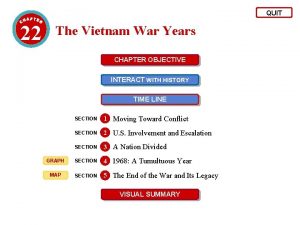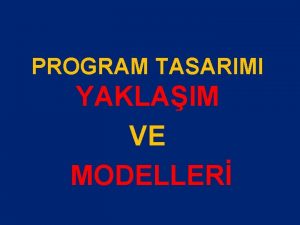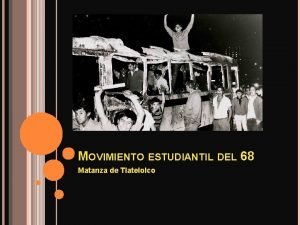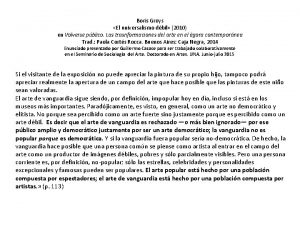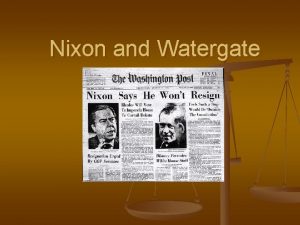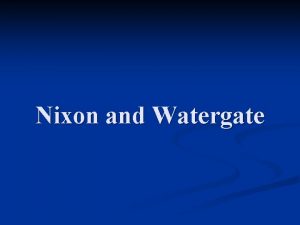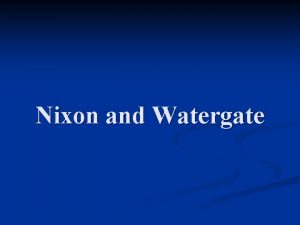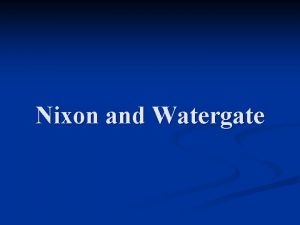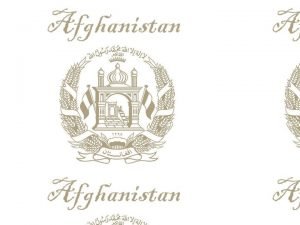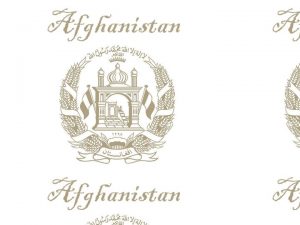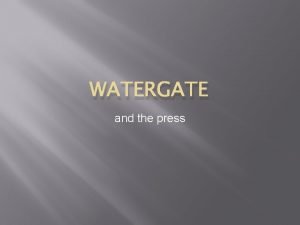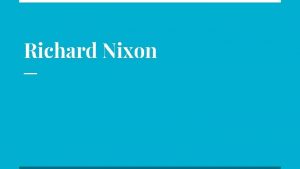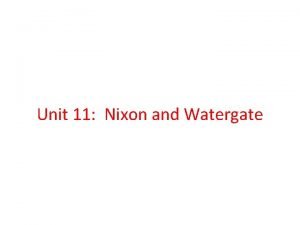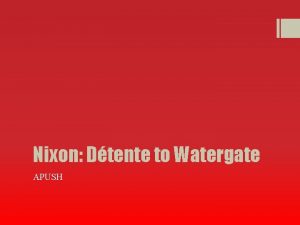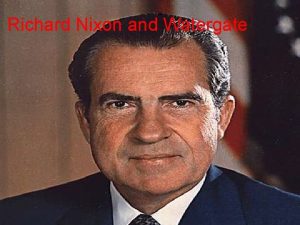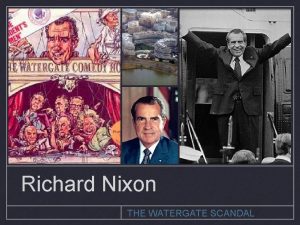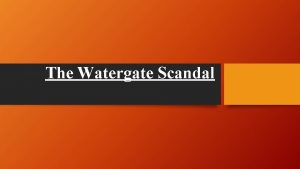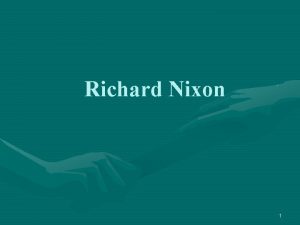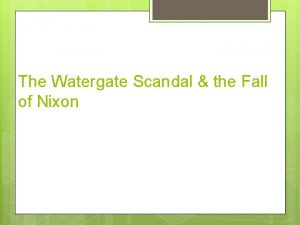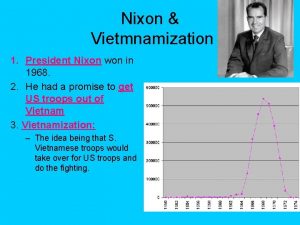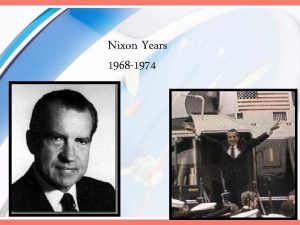Nixon and Watergate The Election of 1968 n






















- Slides: 22

Nixon and Watergate

The Election of 1968 n n n Richard Nixon narrowly won the 1968 election, but the combined total of votes for Nixon and Wallace indicated a shift to the right in American politics. The 1960's began as an era of optimism and possibility and ended in disunity and distrust. The Vietnam war eroded public trust in government

The Election of 1968 n n n Nixon campaigned as a champion of the "silent majority, " He vowed to restore respect for the rule of law, reconstitute the stature of America. He promised to dispose of many social programs, and provide strong leadership to end the turmoil of the 1960's.

Nixon & the USSR n Nixon accomplished a cease fire in Nam n n n also negotiated arms reduction with USSR Strategic Arms Limitation Talks (SALT I & SALT II) refers to two rounds of talks and corresponding treaties between the US and USSR. Negotiations started in Helsinki, Finland in 1969. n Focused on limiting stocks of nuclear weapons. n Caps on each side's number of nuclear weapons. n

Nixon and China n Nixon visited China (PRC) in 1972 First president to visit mainland China while in office n First major attempt to create normalized relations since 1949 n n n The trip was an important step in normalizing relations between the US and China It resulted in establishment of diplomatic relations between the two countries in 1979.

Daniel Ellsberg and the Pentagon Papers n n Daniel Ellsberg - employee of the Defense Department. n Leaked a classified assessment (Pentagon Papers) of the Vietnam War in 1971. Pentagon Papers: Compiled under order of Sec. of Defense Robert Mc. Namara n 7, 000 page document describing US involvement in Vietnam. n Displayed that US officials doubted the justification for entry into the war n Revealed that senior government officials had serious misgivings about the war. n Showed that US leaders expanded the war despite pbulicly claiming a desire to find a way out of the war.

Pentagon Papers n n When the New York Times and Washington Post began to publish the Pentagon Papers, the Nixon Administration sued them. The Supreme Court ruled that the papers could continue to publish the documents. Nixon infuriated Nixon White House began compiling list of politicians and journalists considered enemies or opponents. Nixon begins to show increasing signs of paranoia.

The White House Plumbers n After the Pentagon Papers, White House created a unit to ensure internal security. n Howard Hunt G. Gordon Liddy n n James Mc. Cord Chuck Colson Called the Plumbers because they stopped leaks. In 1971 they burglarized the office of Daniel Ellsberg’s psychiatrist, seeking material to discredit him. It was later revealed that Nixon’s domestic advisor John Ehrlichman knew of and approved the plan.

The Watergate Hotel Break-in n During the Election of 1972, Democratic candidate George Mc. Govern complained of ‘funny business’ by the Nixon campaign. WATERGATE BEGINS n On 17 June 1972, 5 men were arrested while attempting to bug the headquarters of the Democratic Party inside the Watergate building in Washington D. C. n n One of the men, James Mc. Cord, was the head of security for the Republican Party. The Nixon campaign denied involvement.

Woodward & Bernstein: Washington Post n n Watergate came to public attention largely through the work of Bob Woodward and Carl Bernstein, investigative reporters from the Washington Post. Woodward & Bernstein: assisted by a source only known as “Deep throat” whose cover was kept until revealed in 2005. “Deep Throat” was revealed to be Mark Felt – Associate Director of the FBI at the time of Watergate. Despite political pressure Washington Post continued pushing the story until Nixon’s resignation.

Watergate Enters the Nixon Campaign n The break-in was tied to the Nixon reelection campaign through a $25, 000 check from a Republican donor, laundered through a Mexican bank, and deposited in the account of Watergate burglar Bernard Barker. Later it was discovered that Former Attorney General John Mitchell, head of Nixon’s “Committee to Re-Elect the President, ” (CREEP) controlled a secret fund for political espionage. Mitchell would later go to prison for his role in the scandal

The Election of 1972 n n Despite the growing stain of Watergate, which had not yet reached the President, Nixon won by the largest margin in history to that point. Nixon was too paranoid to allow an investigation of what would have been – in all likelihood – a small scandal. He pursued a cover-up instead.

The Watergate Investigations: Judge John Sirica n n Watergate came to be investigated by a Special Prosecutor, a Senate committee, and by the judge in the original break-in case. Judge Sirica refused to believe that the burglars had acted alone. In March 1973, defendant James W. Mc. Cord sent a letter to Sirica confirming that it was a conspiracy. Sirica’s investigation transformed Watergate from the story of a “third-rate burglary” to a scandal reaching the highest points in government.

Senate Investigation and the Oval Office Tapes n n The Senate began hearings into Watergate in May 1973. The hearings were televised in their entirety. They focused on when the President knew of the break-in. In June 1973, former White House legal counsel John Dean delivered devastating testimony that implicated Nixon from the earliest days of Watergate.

Senate Investigation and the Oval Office Tapes n n The Administration was eager to discredit Dean and his testimony. It began to release factual challenges to his account. When former White House aide Alexander Butterfield was asked about the source of the White House information, he revealed the existence of an automatic taping system that Nixon had secretly installed in the Oval Office. These tapes would become the focus of the investigation. n Subpoena

The Smoking Gun Tapes n n n Nixon was ordered to release the tapes, and he refused Supreme Court ordered release of tapes One tape has an 18 ½ minute gap. Nixon’s secretary demonstrated how she could have inadvertently erased the tape. Assumption: attempt to cover for Nixon. “The smoking gun tapes, ” Implicate Nixon from the earliest days of the cover-up. The tapes proved that Nixon: 1. authorized the payment of hush money to witnesses 2. attempted to use the CIA to interfere with the FBI

The Saturday Night Massacre n n The Administration reached an agreement with the Senate Watergate Committee. n Chairman would be allowed to listen to tapes and provide a transcript to the Committee and to Special Prosecutor Archibald Cox refused to accept the transcripts in place of the tapes. The Special Prosecutor is an employee of the Justice Department. Nixon ordered Attorney General Elliot Richardson to fire Cox. n To the public Nixon seemed to be interfering with the investigation. n Seemed to be an admission of guilt.

The Saturday Night Massacre n Richardson refused to follow Nixon’s order. n n Nixon ordered Deputy Attorney General William D. Ruckelshaus to fire Cox. n n n Nixon fired Richardson. Ruckelshaus refused Nixon fired Ruckelhaus Nixon then ordered Solicitor General Robert Bork (who was later nominated for the Supreme Court by Reagan) to fire Cox and he complied. Washington Post called this event the “Saturday Night Massacre”

Spiro Agnew n n n Vice President Spiro Agnew was also under investigation for bribery, conspiracy, tax fraud, and extortion. Was famous for calling his critics as "nattering nabobs of negativism" Resigned from office in October of 1973. He was replaced by Gerald Ford.

Nixon Resigns n n n On 27 July 1974, the House approved Articles of Impeachment against Nixon. Republicans in the House and Senate informed Nixon that he would not survive the vote. On 9 August 1974, Richard Nixon became the first American president to resign.

Aftermath Ford announcing the pardon n n n More than 30 government officials went to prison for their role in Watergate. Richard Nixon was not one of them. In September 1974, President Gerald Ford gave Nixon a full pardon. Woodward and Bernstein won the Pulitzer Prize. They collaborated on 2 books, All the President’s Men and The Final Days. In 1976 All the President’s Men was adapted into an Oscar winning film.

Nixon displays the V for Victory as he departs the White House for the last time after resigning
 Chapter 24 section 2 watergate answers
Chapter 24 section 2 watergate answers The scandal known as watergate originated from the
The scandal known as watergate originated from the Watergate cold war
Watergate cold war Watergate scandal
Watergate scandal Watergate scandal
Watergate scandal Us history eoc political cartoons
Us history eoc political cartoons Tricky dicky richard nixon
Tricky dicky richard nixon Orne and holland 1968
Orne and holland 1968 Railway discipline and appeal rules book
Railway discipline and appeal rules book Atkinson en shiffrin
Atkinson en shiffrin Divercation of recti
Divercation of recti Bimanual palpation spleen
Bimanual palpation spleen Kohlberg 1968
Kohlberg 1968 álmok szárnyán 1968
álmok szárnyán 1968 Chapter 22 section 4 1968 a tumultuous year
Chapter 22 section 4 1968 a tumultuous year Program tasarım yaklaşımları
Program tasarım yaklaşımları Introduccion de la matanza de tlatelolco
Introduccion de la matanza de tlatelolco Gülseren esen kocaman
Gülseren esen kocaman Richard serra splashing 1968
Richard serra splashing 1968 1968 programı
1968 programı He is the author of icnofalangometrica.
He is the author of icnofalangometrica. Spaulding 1968
Spaulding 1968 1968 cost of living
1968 cost of living

